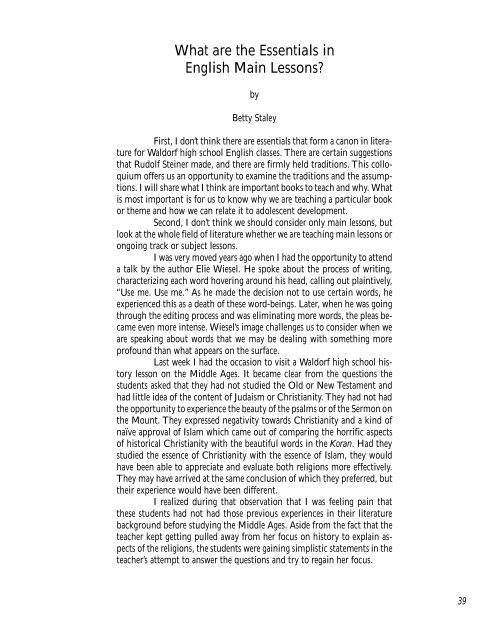Colloquium on English - Research Institute for Waldorf Education
Colloquium on English - Research Institute for Waldorf Education
Colloquium on English - Research Institute for Waldorf Education
Create successful ePaper yourself
Turn your PDF publications into a flip-book with our unique Google optimized e-Paper software.
What are the Essentials in<br />
<strong>English</strong> Main Less<strong>on</strong>s?<br />
by<br />
Betty Staley<br />
First, I d<strong>on</strong>’t think there are essentials that <strong>for</strong>m a can<strong>on</strong> in literature<br />
<strong>for</strong> <strong>Waldorf</strong> high school <strong>English</strong> classes. There are certain suggesti<strong>on</strong>s<br />
that Rudolf Steiner made, and there are firmly held traditi<strong>on</strong>s. This colloquium<br />
offers us an opportunity to examine the traditi<strong>on</strong>s and the assumpti<strong>on</strong>s.<br />
I will share what I think are important books to teach and why. What<br />
is most important is <strong>for</strong> us to know why we are teaching a particular book<br />
or theme and how we can relate it to adolescent development.<br />
Sec<strong>on</strong>d, I d<strong>on</strong>’t think we should c<strong>on</strong>sider <strong>on</strong>ly main less<strong>on</strong>s, but<br />
look at the whole field of literature whether we are teaching main less<strong>on</strong>s or<br />
<strong>on</strong>going track or subject less<strong>on</strong>s.<br />
I was very moved years ago when I had the opportunity to attend<br />
a talk by the author Elie Wiesel. He spoke about the process of writing,<br />
characterizing each word hovering around his head, calling out plaintively,<br />
“Use me. Use me.” As he made the decisi<strong>on</strong> not to use certain words, he<br />
experienced this as a death of these word-beings. Later, when he was going<br />
through the editing process and was eliminating more words, the pleas became<br />
even more intense. Wiesel’s image challenges us to c<strong>on</strong>sider when we<br />
are speaking about words that we may be dealing with something more<br />
profound than what appears <strong>on</strong> the surface.<br />
Last week I had the occasi<strong>on</strong> to visit a <strong>Waldorf</strong> high school history<br />
less<strong>on</strong> <strong>on</strong> the Middle Ages. It became clear from the questi<strong>on</strong>s the<br />
students asked that they had not studied the Old or New Testament and<br />
had little idea of the c<strong>on</strong>tent of Judaism or Christianity. They had not had<br />
the opportunity to experience the beauty of the psalms or of the Serm<strong>on</strong> <strong>on</strong><br />
the Mount. They expressed negativity towards Christianity and a kind of<br />
naïve approval of Islam which came out of comparing the horrific aspects<br />
of historical Christianity with the beautiful words in the Koran. Had they<br />
studied the essence of Christianity with the essence of Islam, they would<br />
have been able to appreciate and evaluate both religi<strong>on</strong>s more effectively.<br />
They may have arrived at the same c<strong>on</strong>clusi<strong>on</strong> of which they preferred, but<br />
their experience would have been different.<br />
I realized during that observati<strong>on</strong> that I was feeling pain that<br />
these students had not had those previous experiences in their literature<br />
background be<strong>for</strong>e studying the Middle Ages. Aside from the fact that the<br />
teacher kept getting pulled away from her focus <strong>on</strong> history to explain aspects<br />
of the religi<strong>on</strong>s, the students were gaining simplistic statements in the<br />
teacher’s attempt to answer the questi<strong>on</strong>s and try to regain her focus.<br />
39

















